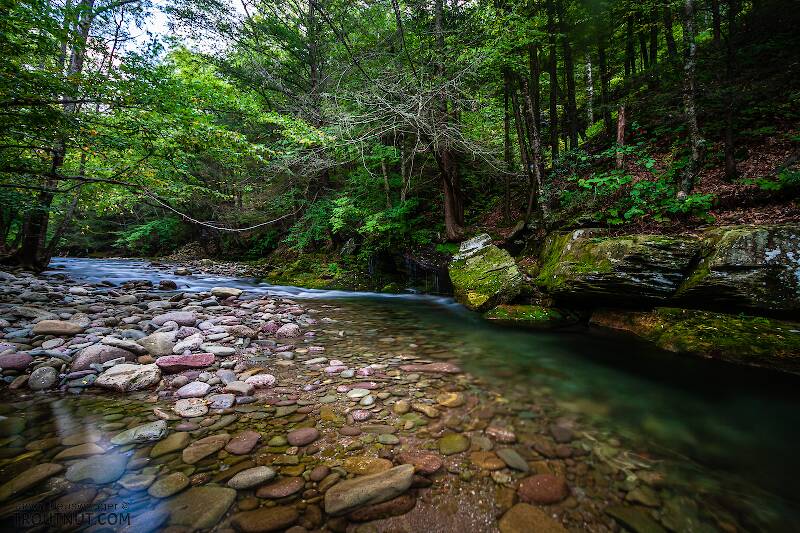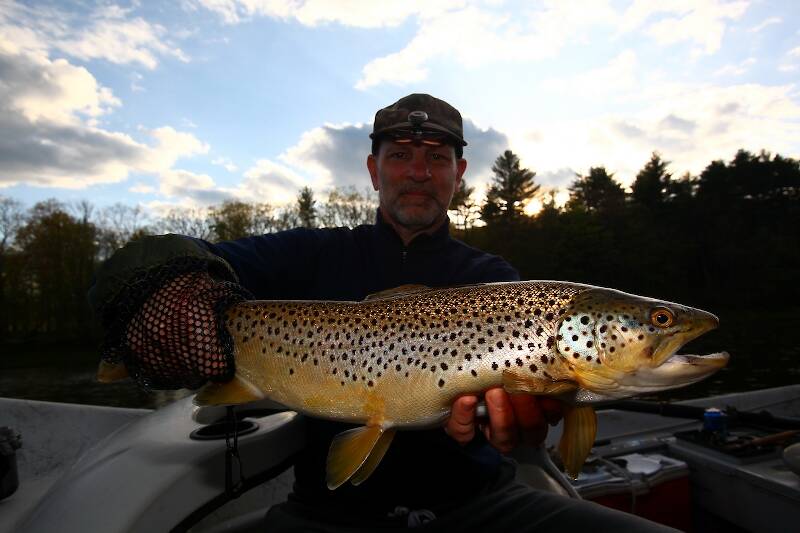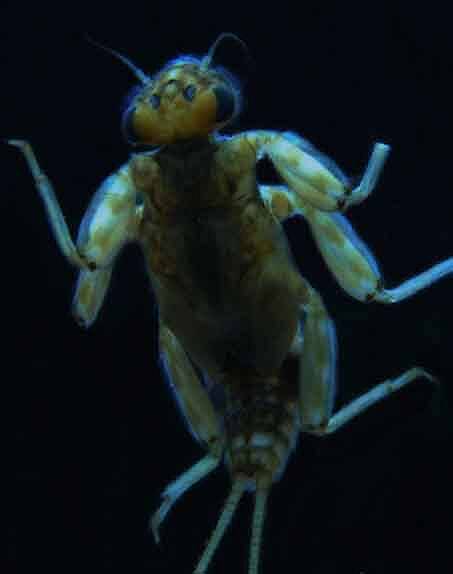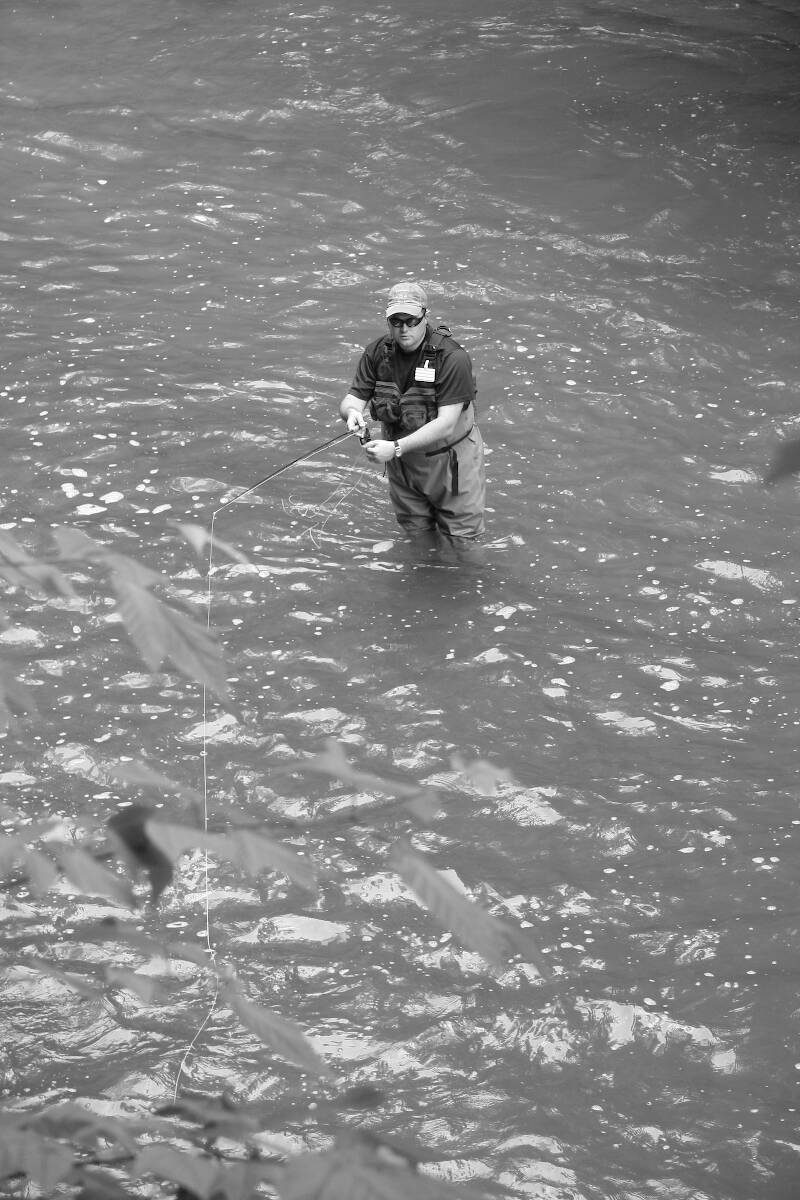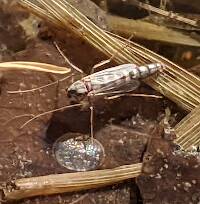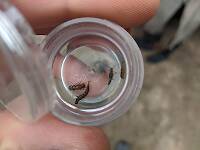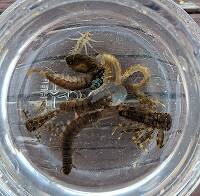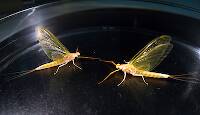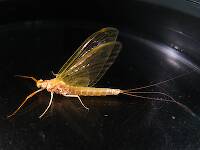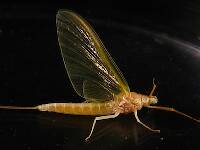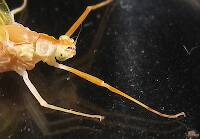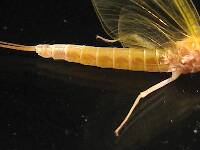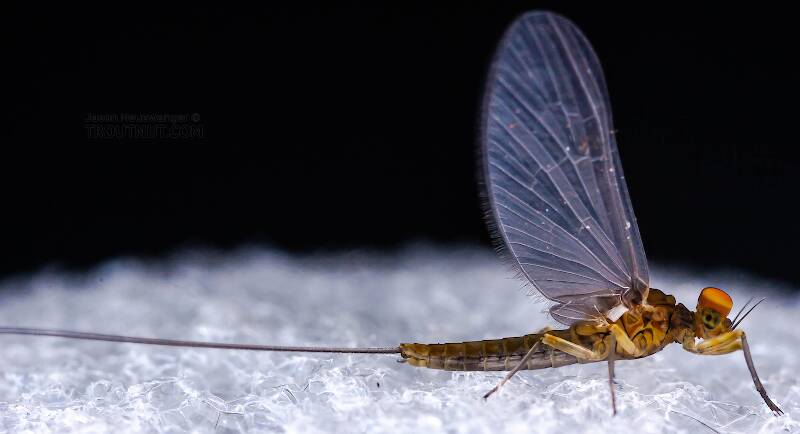
Blue-winged Olives
Baetis
Tiny Baetis mayflies are perhaps the most commonly encountered and imitated by anglers on all American trout streams due to their great abundance, widespread distribution, and trout-friendly emergence habits.
Featured on the forum
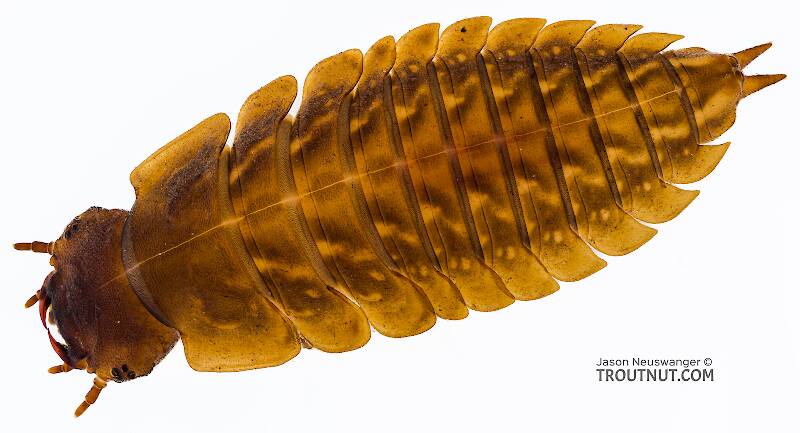
This is the first of it's family I've seen, collected from a tiny, fishless stream in the Cascades. The three species of this genus all live in the Northwest and are predators that primarily eat stonefly nymphs Merritt R.W., Cummins, K.W., and Berg, M.B. (2019).

Troutnut is a project started in 2003 by salmonid ecologist Jason "Troutnut" Neuswanger to help anglers and
fly tyers unabashedly embrace the entomological side of the sport. Learn more about Troutnut or
support the project for an enhanced experience here.
Troutnut on Apr 27, 2009April 27th, 2009, 9:44 pm EDT
Hellgramite expressed a fairly common complaint in another topic:
This has been addressed in an entertaining way already, but there's a serious and worthwhile question behind it. This post is my (appropriately) complicated answer.
Fly fishing doesn't need to be any more complex than you want to make it for yourself, but there are many worthwhile reasons to want to complicate things. Sometimes it helps catch more fish, or bigger fish, or even one particularly difficult little fish that means more than the others because it required some clever trick. Most of the time, though, it just helps us understand more of what's going on around us on the stream.
Every fish and insect is the lead character in its own story, a story we glimpse only briefly as we cross paths on the river. Scientific details help us see the rest of the story, making our piece of it more meaningful. Think about watching two 30-second clips of television, one from your favorite show and one from a show you've never seen. The unfamiliar clip my be enjoyable, but you don't get much out of it beyond what happens in those 30 seconds. You probably can't guess the plot or tell very much about the characters. But if the clip comes from your favorite show, you can figure out exactly what's going on. You recognize the setting. You know the personality and background of each character, so you can guess what happened earlier to cause the current situation, and how they're likely to react. The clip reminds you of their past adventures and makes you anxious to see what happens next. Everything that happens in those 30 seconds is more meaningful because you can put it in the context of the whole show.
Fly fishing is just like that. The science behind it is the greater story that ties everything together, and the entomology helps us keep the characters straight and deepens their stories.
For example, look at Konchu's recent topic about parthenogenesis in Brown Duns, Ameletus ludens. Parthenogenesis is reproduction by females without fertilization by a male, and A. ludens is one of only a few mayflies that can do it. It's pretty hard to imagine this knowledge ever helping someone catch an extra trout. But it does a lot for the story when you're out on the river and see A. ludens flying around. You'll know that that mayfly is very different from most of the others. It's not seeking a mate. It doesn't have two parents. Instead, it could be one of a long line of nearly identical clones, its DNA relatively unchanged from that of its great-great-(great x 150)-great grandmother that might have flown across a civil war battlefield on its own brief journey. Essentially the same bug existed as a genetic carbon copy year after year after year since before your grandparents were born. Each link in that chain survived countless close calls with everything from drought to predatory stoneflies to deer hooves, and--GULP--you just watched the grand finale, an ancient lineage ended in one slurp by a 7-inch brook trout. Now that's a story. It's far more interesting than, "A brown bug just flew by."
Fly fishing can be about even more than these good stories, though (or about catching fish, or just enjoying how pretty it all is).
It appeals to puzzle-solvers. Some enjoy crosswords or Sudoku, or even mathematical proofs. I like watching a trout's every move and trying to figure each one out. It just went over and nipped at that other trout -- what did the other one do to provoke it? It just came up to the surface and hovered for a few seconds without seeming to grab anything -- why? The puzzles go on and on, and many get very deep. My favorite is the question of why trout sometimes key in on a hatch of tiny mayflies like Tricos and ignore bigger, meatier morsels during that time. You don't need to think about these questions to improve your fishing (although, of all these obsessions, this one is the most applicable), but it does make every fishing trip more interesting.
Aquatic entomology appeals to collectors. Some like coins or baseball cards. I collect trout stream insects and pictures of them. For me and many others, finding a good specimen of an uncommon species is exciting like finding a Mickey Mantle rookie card in the closet... if not quite as lucrative.
Realistic tying, fine rod-building, and photography appeal to artists. I don't think this needs to be explained; a realistic fly tier's attention to detail is as easy to understand as that of any painter, sculptor, or filmmaker.
We don't jump into these complex things because we think we need them to catch fish. We do it because they're fulfilling in their own right, whether we're story-lovers, puzzle-solvers, collectors, artists, or all of the above. This site welcomes anglers with all motivations, but my vision for it is to be a special haven for those who indulge in the sport's complexity. We will continue to proudly discuss Latin names, the proper thickness of realistic thread legs, and the obscure behavior and anatomy of insects. If one of those topics isn't your cup of tea, just skip it and move on to the next one.
I gotta tell ya you guys up in the North East must have some vary long winters.Maybe its just me but my brain is smoking just reading these posts.My head is spinning over how deep some of you guys get with this stuff.What ever happened to just fly fishing for Trout.I never thought I would need a PHD just to talk about fly fishing.
This has been addressed in an entertaining way already, but there's a serious and worthwhile question behind it. This post is my (appropriately) complicated answer.
Fly fishing doesn't need to be any more complex than you want to make it for yourself, but there are many worthwhile reasons to want to complicate things. Sometimes it helps catch more fish, or bigger fish, or even one particularly difficult little fish that means more than the others because it required some clever trick. Most of the time, though, it just helps us understand more of what's going on around us on the stream.
Every fish and insect is the lead character in its own story, a story we glimpse only briefly as we cross paths on the river. Scientific details help us see the rest of the story, making our piece of it more meaningful. Think about watching two 30-second clips of television, one from your favorite show and one from a show you've never seen. The unfamiliar clip my be enjoyable, but you don't get much out of it beyond what happens in those 30 seconds. You probably can't guess the plot or tell very much about the characters. But if the clip comes from your favorite show, you can figure out exactly what's going on. You recognize the setting. You know the personality and background of each character, so you can guess what happened earlier to cause the current situation, and how they're likely to react. The clip reminds you of their past adventures and makes you anxious to see what happens next. Everything that happens in those 30 seconds is more meaningful because you can put it in the context of the whole show.
Fly fishing is just like that. The science behind it is the greater story that ties everything together, and the entomology helps us keep the characters straight and deepens their stories.
For example, look at Konchu's recent topic about parthenogenesis in Brown Duns, Ameletus ludens. Parthenogenesis is reproduction by females without fertilization by a male, and A. ludens is one of only a few mayflies that can do it. It's pretty hard to imagine this knowledge ever helping someone catch an extra trout. But it does a lot for the story when you're out on the river and see A. ludens flying around. You'll know that that mayfly is very different from most of the others. It's not seeking a mate. It doesn't have two parents. Instead, it could be one of a long line of nearly identical clones, its DNA relatively unchanged from that of its great-great-(great x 150)-great grandmother that might have flown across a civil war battlefield on its own brief journey. Essentially the same bug existed as a genetic carbon copy year after year after year since before your grandparents were born. Each link in that chain survived countless close calls with everything from drought to predatory stoneflies to deer hooves, and--GULP--you just watched the grand finale, an ancient lineage ended in one slurp by a 7-inch brook trout. Now that's a story. It's far more interesting than, "A brown bug just flew by."
Fly fishing can be about even more than these good stories, though (or about catching fish, or just enjoying how pretty it all is).
It appeals to puzzle-solvers. Some enjoy crosswords or Sudoku, or even mathematical proofs. I like watching a trout's every move and trying to figure each one out. It just went over and nipped at that other trout -- what did the other one do to provoke it? It just came up to the surface and hovered for a few seconds without seeming to grab anything -- why? The puzzles go on and on, and many get very deep. My favorite is the question of why trout sometimes key in on a hatch of tiny mayflies like Tricos and ignore bigger, meatier morsels during that time. You don't need to think about these questions to improve your fishing (although, of all these obsessions, this one is the most applicable), but it does make every fishing trip more interesting.
Aquatic entomology appeals to collectors. Some like coins or baseball cards. I collect trout stream insects and pictures of them. For me and many others, finding a good specimen of an uncommon species is exciting like finding a Mickey Mantle rookie card in the closet... if not quite as lucrative.
Realistic tying, fine rod-building, and photography appeal to artists. I don't think this needs to be explained; a realistic fly tier's attention to detail is as easy to understand as that of any painter, sculptor, or filmmaker.
We don't jump into these complex things because we think we need them to catch fish. We do it because they're fulfilling in their own right, whether we're story-lovers, puzzle-solvers, collectors, artists, or all of the above. This site welcomes anglers with all motivations, but my vision for it is to be a special haven for those who indulge in the sport's complexity. We will continue to proudly discuss Latin names, the proper thickness of realistic thread legs, and the obscure behavior and anatomy of insects. If one of those topics isn't your cup of tea, just skip it and move on to the next one.
Jason Neuswanger, Ph.D.
Troutnut and salmonid ecologist
Troutnut and salmonid ecologist
Martinlf on Apr 28, 2009April 28th, 2009, 2:05 am EDT
If one of those topics isn't your cup of tea, just skip it and move on to the next one.
That seems like a reasonable response. We can tease each other a bit from time to time, but, as JAD has said, don't let your nose hairs become too visible. One can be snooty about using Latin names, or one can be just as snooty about refusing to use them.
I also found Jason's analogy to watching a clip from a show entertaining and instructive. I'm often very pragmatic and goal oriented with my fishing, and don't stop to check the bugs carefully as much as some others do. But when I do pull out my sample net and find out what's in the water, I always enjoy it. Years ago I spent several hours sampling and I found that a small spring creek that has been my nemesis has lots of aquatic earthworms in one section. A few months ago I caught three times more fish in that section than ever before using a San Juan worm. That day of sampling paid off years later, and gave me one of the most satisfying days of fishing I've had this season.
Finally, I'd observe that this site is primarily focused on a scientific approach to understanding insects. There are many general sites out there that aren't. Though I take umbrage at his disdain for haiku, I'm always happy that Jason at least welcomes general discussions, so while I'm in his house, I try to be respectful of his taste in furniture. At least most of the time.
"He spread them a yard and a half. 'And every one that got away is this big.'"
--Fred Chappell
--Fred Chappell
LittleJ on Apr 28, 2009April 28th, 2009, 11:36 am EDT
Do you mean there is someone who doesn't understand why we spend countless hours pouring over information on bugs,and ties, and techniques, and countless more hours trying to figure out if anything we have learned is relevant in any way to the actual fishing? Who knew........... Wait a minute, was my wife posting again?
Shawnny3 on Apr 28, 2009April 28th, 2009, 1:31 pm EDT
Why we make fly fishing complicated: Because it's more fun that way.
-Shawn
-Shawn
Jewelry-Quality Artistic Salmon Flies, by Shawn Davis
www.davisflydesigns.com
www.davisflydesigns.com
Softhackle on Apr 28, 2009April 28th, 2009, 2:55 pm EDT
I had a big long response that I had written ,but decided to try to shorten and simplify it a bit.
Fly fishermen like to "immerse themselves in the process" of fly fishing. The more they do, the more they experience the experience. It's a very basic characteristic that many people need.
If a longer explanation is required, I'll give it, but I think most of you will understand.
Mark
Fly fishermen like to "immerse themselves in the process" of fly fishing. The more they do, the more they experience the experience. It's a very basic characteristic that many people need.
If a longer explanation is required, I'll give it, but I think most of you will understand.
Mark
"I have the highest respect for the skilled wet-fly fisherman, as he has mastered an art of very great difficulty." Edward R. Hewitt
Flymphs, Soft-hackles and Spiders: http://www.troutnut.com/libstudio/FS&S/index.html
Flymphs, Soft-hackles and Spiders: http://www.troutnut.com/libstudio/FS&S/index.html
Hellgramite on Apr 28, 2009April 28th, 2009, 3:44 pm EDT
I am a very simple person.I understand all about what you have talked about.I grew up with people at work who took simple and made it complicated.When after many years of paying my dues it was my turn.I told myself that I was going to uncomplicate things.I rose to the top 5% in my industry.With that said when I started Trout fishing at age 7 I used Velveeta cheese.Then at age 25 I fished flies I bought at Big 5 on a spinning outfit.At age 28 I bought my first fly rod and jumped in head first.The hardest thing for me to figure out was the insect thing.After many hours of research I found that everyone I talked to kept making my head spin.I found a book called (Sierra Trout)by Cutter,he explained things in a vary simple way.I fish running water about 99% of the time and very seldom fish lakes.Anyway I'm the guy in shorts and a T shirt,Tennis shoes and my chest pack around my waist.I catch fish 99.9% of the time and am always ready to help my fellow fly fisherman.As you read this you will see I am a simpleton.Please do not misunderstand me.I am not complaining it just seems to me that there are people that like to get involved in conversation,but are left out because some people have taken something simple and made it complicated.Not everyone that fly fishes becomes an entomologist.There was a post by a person the other day stating he was confused about all the different names given to flies and no body gave him an answer.They told him to read this book or that book.In order to have a discussion or debate you must include more than just 3-4 people that seem to take over and somewhat ignore the rest.Trust me I have enough friends all I was looking for was some intelligent,simple conversation about fly fishing.It seems to me that there are a few that think they know all and are not able to listen to what other people have to say.I feel that Jason has done a great job building this website and I hope that it continues to be great,just listen to what other people have to say.
Konchu on Apr 28, 2009April 28th, 2009, 4:39 pm EDT
I'm someone who has spent years as an entomologist and days as a fly fisherman. However, most successes I have had in life can be attributed to making things simple. Most failures because I made things complicated. You can't ignore the complicated, you just have to pick out what is important and relate it to your situation.
So, sometimes I slip into the language of the academic (e.g., facultative parthenogensis in the other thread referenced above), when I could just say what it is (for example, there's men around, but the women can have babies even if they don't "get" any). Don't be afraid to ask "What's that mean?" (isn't that after the credits of most episodes of Two and a Half Men?). Chances are, if you are thinking it, seven other people are, too. At least for me, all this is about learning. Sure, I enjoy sharing some of my experiences, but there are A LOT of people out there who KNOW more than me, and THAT is what I'm after.
So, sometimes I slip into the language of the academic (e.g., facultative parthenogensis in the other thread referenced above), when I could just say what it is (for example, there's men around, but the women can have babies even if they don't "get" any). Don't be afraid to ask "What's that mean?" (isn't that after the credits of most episodes of Two and a Half Men?). Chances are, if you are thinking it, seven other people are, too. At least for me, all this is about learning. Sure, I enjoy sharing some of my experiences, but there are A LOT of people out there who KNOW more than me, and THAT is what I'm after.
Troutnut on Apr 28, 2009April 28th, 2009, 9:13 pm EDT
However, most successes I have had in life can be attributed to making things simple. Most failures because I made things complicated. You can't ignore the complicated, you just have to pick out what is important and relate it to your situation.
Very true. However, one person's simple is another person's complicated. Using Latinized names for bugs is simple for those of us who know them, because there's just one name per bug and one bug per name. Common names are all jumbled up. But for someone who doesn't care to be exact about which bug is which, calling something a "BWO" is simple and there's no conceivable reason in the world to break out a word like Centroptilum instead.
So, sometimes I slip into the language of the academic (e.g., facultative parthenogensis in the other thread referenced above), when I could just say what it is (for example, there's men around, but the women can have babies even if they don't "get" any).
Academic language is fine here, and it's often the shortest, simplest way to communicate some of these ideas. It's good to keep a general audience in mind, but it's not worth dumbing things down.
Don't be afraid to ask "What's that mean?"
Great advice for everyone.
Jason Neuswanger, Ph.D.
Troutnut and salmonid ecologist
Troutnut and salmonid ecologist
Martinlf on Apr 29, 2009April 29th, 2009, 2:12 am EDT
My sense is that no one here wants to leave anyone out, and I'm glad to see such a variety of opinions. I too am sometimes lost in the more detailed scientific discussions, but I don't want them simplified--I'll either work harder to understand them if they interest me, asking some questions, or move on to a topic I can better relate to. My experience here is that everyone is welcome, some of us tease each other sometimes, and we all find different threads that we're willing to weigh in on--or not. I'm glad this topic came up; it gave me a chance to learn a bit more about why I fly fish.
"He spread them a yard and a half. 'And every one that got away is this big.'"
--Fred Chappell
--Fred Chappell
RleeP on Apr 29, 2009April 29th, 2009, 12:37 pm EDT
I don't remember any of this complications stuff being an issue before Art Lee started writing about taking a mid day break from the water to spread a streamside tablecloth and eat some fancy French cheese.
I'm not saying there is a connection, mind you.
But there is a time line...:)
I'm not saying there is a connection, mind you.
But there is a time line...:)
Shawnny3 on Apr 29, 2009April 29th, 2009, 1:54 pm EDT
I am a horrible student of scientific names and don't frequent this site to learn them, though I have made some half-hearted attempts at self-improvement along those lines. On the contrary, the reason I like this forum so much is that I DO feel like I'm welcomed in spite of my paltry contributions to the technical side of things. I've found that most other forums feature much less listening and much more talking out of the arse. I try to stay on the sidelines when things get technical lest I get run over by the academic bus, so to speak, but I don't think anyone on here thinks any less of me for it, and I have no problem with their sharing their technical acumen with us cavemen. The little that rubs off on me is appreciated.
I don't make fishing complicated from a scientific standpoint, but I confess that I do from a creative standpoint. Flytying and flyfishing are the most creative pursuits I have ever had, and I've had many. I firmly believe that the enjoyment I receive from an activity is directly related to how much of myself I invest in it, and flytying and flyfishing offer endless opportunities for me to invest myself further. So I spend endless hours developing patterns, making and tweaking equipment, fishing unconventionally... just because I find it fun. Example: My goal this summer is to catch a fish on a fly tied only from the remains of a single animal - I'm not even sure I'll indulge in a rod and line. There's no practical reason to catch a fish this way - it's just cool to try. So I overcomplicate things for fun.
-Shawn
P.S. As far as not replying to a neophyte's post with more than a book recommendation, I'd contend that pointing the newbie to a good book is far more valuable to them than trying to tell them everything they need to know about flyfishing in three paragraphs. One thing you won't find on this forum very much is people oversimplifying an issue in the interest of brevity, and I think that's a good thing. Typically, when one starts oversimplifying, it is not long before he is talking out of his arse, in which case the post is unhelpful and potentially worse than unhelpful. When one does talk out of his arse on this forum, the typical response is a gentle and cordial steering of the topic in a better direction. That's not always the case, but there is a good deal of quality control that keeps information posted from going bad and then staying that way.
I don't make fishing complicated from a scientific standpoint, but I confess that I do from a creative standpoint. Flytying and flyfishing are the most creative pursuits I have ever had, and I've had many. I firmly believe that the enjoyment I receive from an activity is directly related to how much of myself I invest in it, and flytying and flyfishing offer endless opportunities for me to invest myself further. So I spend endless hours developing patterns, making and tweaking equipment, fishing unconventionally... just because I find it fun. Example: My goal this summer is to catch a fish on a fly tied only from the remains of a single animal - I'm not even sure I'll indulge in a rod and line. There's no practical reason to catch a fish this way - it's just cool to try. So I overcomplicate things for fun.
-Shawn
P.S. As far as not replying to a neophyte's post with more than a book recommendation, I'd contend that pointing the newbie to a good book is far more valuable to them than trying to tell them everything they need to know about flyfishing in three paragraphs. One thing you won't find on this forum very much is people oversimplifying an issue in the interest of brevity, and I think that's a good thing. Typically, when one starts oversimplifying, it is not long before he is talking out of his arse, in which case the post is unhelpful and potentially worse than unhelpful. When one does talk out of his arse on this forum, the typical response is a gentle and cordial steering of the topic in a better direction. That's not always the case, but there is a good deal of quality control that keeps information posted from going bad and then staying that way.
Jewelry-Quality Artistic Salmon Flies, by Shawn Davis
www.davisflydesigns.com
www.davisflydesigns.com
Troutnut on Apr 30, 2009April 30th, 2009, 10:04 am EDT
My goal this summer is to catch a fish on a fly tied only from the remains of a single animal - I'm not even sure I'll indulge in a rod and line.
That includes the hook, right?
People with gold teeth, look out!
Jason Neuswanger, Ph.D.
Troutnut and salmonid ecologist
Troutnut and salmonid ecologist
Flatstick96 on Apr 30, 2009April 30th, 2009, 11:15 am EDT
Shawn has actually already fashioned a hook out of bone - it's on his site (in the "what's new" section).
Shawnny3 on Apr 30, 2009April 30th, 2009, 12:52 pm EDT
Yeah, hook too. Right now plans do not include the remains of Homo sapiens, but I remain openminded.
-Shawn
-Shawn
Jewelry-Quality Artistic Salmon Flies, by Shawn Davis
www.davisflydesigns.com
www.davisflydesigns.com
Patcrisci on May 1, 2009May 1st, 2009, 2:50 am EDT
Do those who know the latin names cacth more trout? Who knows? But know this -- rather they take a more studious approach, by choice, because it's their inclination. As one poster said earlier, you can make this as simple or complicated as you wish, depending on what satisfies your own curiosity. And, yes this applies to every aspect of the sport... from entomology to fly tying to obsessing over rods, reels, lines, etc... There is room for all degrees of involvement from maniacal to casual and there is no right or wrong, better or worse. It's what floats your boat, man! That's my two cents.
Pat Crisci
Flyfisher06 on May 4, 2009May 4th, 2009, 11:19 pm EDT
My question is how can one learn more about these topics to help become a better fisher but not get too wrapped up in it,time constraints? My flyfishing to this point is to enjoy my time and peace on the water.Although some days I get frustrated not knowing what to do to catch a few.Much like birdhunting I know enough about the birds to go to the right cover but then my dogs know the bigger part.I am usually satisfied just to walk and enjoy the sights and sounds of the woods and the enjoyment of watching my dogsbut a few eruptions under my dogs nose is more than welcome to say the least.So in essense what can I do to learn enough to have more eruptions at the end of my tippet without getting too crazy ? Is this a good inqiry or is it kind of selfish. Thanks Guys
IF I am not flyfishing or bird hunting I must be doing something bad like working !!
Softhackle on May 5, 2009May 5th, 2009, 2:50 am EDT
Hi,
In answer to a very good question. You do not need to know all the latin names to insects. What you need to know is, I believe, trout behavior and characteristics. This will give you more insight and help you understand what you need to do to give the fish what they are looking for. Often times presentation is much more critical than fly selection. Being able to analyze a given situation so that you present your flies in a way that pleases the fish or convinces the fish your fly is the real deal is imperative. This will definitely increase your success rate.
Another good angle to learning more is to concentrate on one stream/river. I read one time that those who have learned the most and contributed the most to the advancement of fly fishing were those that focused their attention on one place or small group on places in proximity. Focusing on one stream will teach you a lot. You will learn what insects are hatching and when, and you will learn how the fish in your place behave.
Mark
In answer to a very good question. You do not need to know all the latin names to insects. What you need to know is, I believe, trout behavior and characteristics. This will give you more insight and help you understand what you need to do to give the fish what they are looking for. Often times presentation is much more critical than fly selection. Being able to analyze a given situation so that you present your flies in a way that pleases the fish or convinces the fish your fly is the real deal is imperative. This will definitely increase your success rate.
Another good angle to learning more is to concentrate on one stream/river. I read one time that those who have learned the most and contributed the most to the advancement of fly fishing were those that focused their attention on one place or small group on places in proximity. Focusing on one stream will teach you a lot. You will learn what insects are hatching and when, and you will learn how the fish in your place behave.
Mark
"I have the highest respect for the skilled wet-fly fisherman, as he has mastered an art of very great difficulty." Edward R. Hewitt
Flymphs, Soft-hackles and Spiders: http://www.troutnut.com/libstudio/FS&S/index.html
Flymphs, Soft-hackles and Spiders: http://www.troutnut.com/libstudio/FS&S/index.html
Troutnut on May 5, 2009May 5th, 2009, 9:54 am EDT
My question is how can one learn more about these topics to help become a better fisher but not get too wrapped up in it,time constraints? My flyfishing to this point is to enjoy my time and peace on the water.
Easy: Learn whatever you enjoy learning. If you get wrapped up in it because you're enjoying it, then lost time on the water isn't a problem. I certainly spend less time fishing because I'm screwing around with bugs, and that's okay, because I'm having just as much fun poking through bugs.
In answer to a very good question. You do not need to know all the latin names to insects. What you need to know is, I believe, trout behavior and characteristics.So in essense what can I do to learn enough to have more eruptions at the end of my tippet without getting too crazy ?
Trout behavior is definitely the best starting point. Perfection of your presentation skills is another good one.
As far as actually bringing more trout to hand goes, entomology is fairly low on the list. Even there, the basics of mayfly, caddisfly, stonefly, and midge life cycles will get you a long way. It can also be fun and useful to get into the nitty gritty details of insect behavior, and that's where Latin names come in handy. Identifying a bug by its Latin name allows you to look it up and access all the other knowledge people have gained about its behavior over the years. That comes in most handy when you find picky fish rising and can't see what they're taking.
Jason Neuswanger, Ph.D.
Troutnut and salmonid ecologist
Troutnut and salmonid ecologist
Flyfisher06 on May 5, 2009May 5th, 2009, 12:01 pm EDT
I hope I didnt sound greedy I am ussually satisfied if I catch a few I just want to eliminate those frustrating days and even size isnt important a small trout brings me the same satisfaction as a larger one,well almost,caught my myself almost fibbing.Thanks guys
IF I am not flyfishing or bird hunting I must be doing something bad like working !!
Ceejay77
Posts: 1
Posts: 1
Ceejay77 on May 14, 2009May 14th, 2009, 6:17 pm EDT
I am new to fly fishing and it has always sounded complicated to me so until now I have fished with bait and lure however a video I watched the guy stressed it is simply practice and a learning experience and not complicated.
http://thaigirlsdating.com
Quick Reply
Related Discussions
Topic
Replies
Last Reply
1
Apr 18, 2007
by Troutnut
by Troutnut
2
Apr 20, 2020
by DangerAF1
by DangerAF1
14
Jun 15, 2012
by Entoman
by Entoman
Re: Last summer while fishing on the Henry's Fork in Idaho.....Is it Epeorus Pleuralis???
In the Identify This! Board by Byhaugh
In the Identify This! Board by Byhaugh
10
Jan 16, 2014
by Entoman
by Entoman
1
Oct 24, 2008
by Brookyman
by Brookyman

